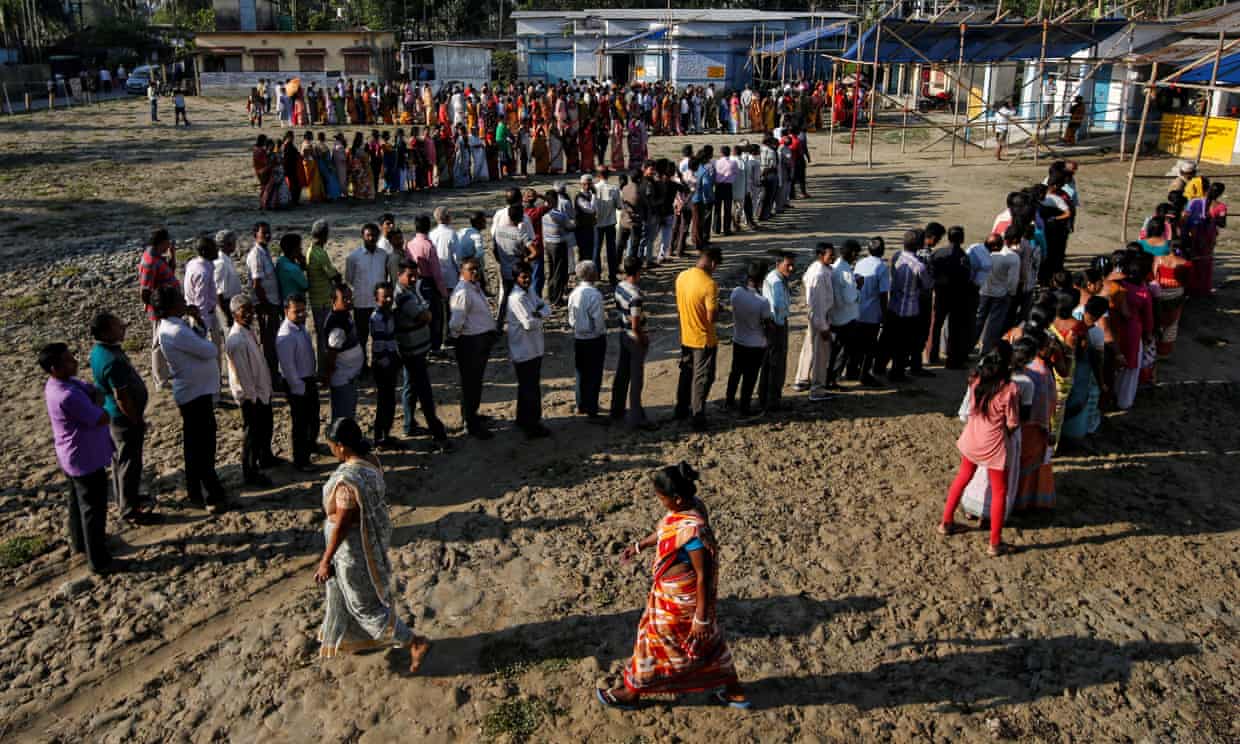
Six weeks of voting begins today, with many viewing it as a referendum on the prime minister, Narendra Modi
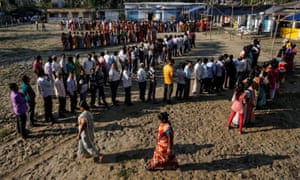
The world’s largest-ever election has started in India, with voters in 20 states casting their ballots in the first phase of the country’s marathon six-week polls.
The contest in the vast country of 1.3 billion people is dominated by local issues but also viewed as a referendum on Prime Minister Narendra Modi, a staunch Hindu nationalist who rode a wave of popularity five years ago to become the first leader of a majority government in decades.
Polls are now open in 91 seats, about a sixth of the total in the Indian parliament’s lower house, with six more voting days to be held before the results are announced on 23 May.
Modi encouraged Indians in a tweet on Thursday morning to “turn out in record numbers and exercise their franchise”, singling out the 45m young people who have been added to the voter rolls since 2014.
The districts voting on Thursday include parts of north India’s “cow belt”, the agrarian states that Modi’s Bharatiya Janata party (BJP) swept in 2014 but where it is expected to shed seats this time around.
It will seek to make up those numbers in states such as West Bengal, parts of which are also voting today, and where the BJP’s message of Hindu unity, muscular foreign policy and pro-business reform has met with greater resistance from powerful regional parties.
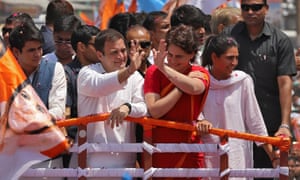
India’s phased election process allows federal security personnel to be shuttled around the country to secure the integrity of a contest involving up to 900 million eligible voters, more than the next five largest democracies combined.
Voters will make their choice using machines that display a paper record of their selection that is then stored in an attached locked box. Their fingers are marked with indelible ink to prevent anyone voting twice. Symbols and pictures are displayed next to candidate’s names to aid the country’s estimated 266 million illiterate citizens.
At a public school turned voting station in Noida, a city that borders Delhi, voters arrived throughout the morning in cars, on motorcycles and by rickshaw. Their IDs were checked at a booth decked in an elaborate lace pink curtain, marking the polling station out as one staffed entirely by women.
“This country is better off in all fields [under Modi],” said a man who gave his name as Bhoj, and said he was a surgeon. “Earlier we used to live under a scary environment, with politicians in nexus with criminals and terrorists. The feel-good factor is back.”
A “selfie point” had been erected out the front of the station, encouraging voters to take pictures showing their fingers marked with the indelible ink to prevent them from voting more than once.
“Basically, I’m seriously concerned about the country descending into fascism,” said another man after emerging from the school. “All the institutions are being centralised under one man’s control.” He declined to give his name.
Kashmir plays at the polls
The first weeks of campaigning were overshadowed by a car bombing in February that killed 40 paramilitaries in disputed Kashmir and triggered the first aerial dog-fights and air strikes between India and Pakistan in half a century.
Polls in the aftermath of those clashes suggest they played to Modi’s advantage and temporarily took the focus off issues where he is thought to be more vulnerable, such as the inability of the Indian economy to create formal jobs and plummeting incomes in the country’s debt-ridden farming sector.
At BJP rallies across the country, campaigners including Modi have emphasised the government’s response to the car bombing in Pulwama, a southern Kashmir district, and condemned opposition figures who questioned the official narrative that India destroyed a terrorist training camp in the Pakistani town of Balakot.
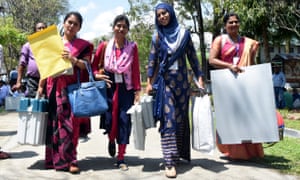
“I want to ask first-time voters: Can your first vote be dedicated to the courageous jawans [soldiers] who did the Balakot air strike?” Modi told a rally in Maharashtra on Tuesday, in remarks that his critics said politicised the military. “Can your first vote be in the name of the courageous martyrs who lost their lives in Pulwama?”
The main opposition Congress party has made social policies the centrepiece of its campaign, especially its minimum income guarantee, a plan to top up the bank accounts of the poorest fifth of the country with 6,000 rupees per month.
Crucial to the result will be the performance of India’s powerful regional parties, some of who have set aside ideological and personal differences to form unlikely alliances aimed at limiting the growth of the BJP in their states.
An alliance of the two main regional parties in Uttar Pradesh, for example, is expecting to dent the BJP’s returns in the crucial state.
The anti-Modi factor
The Congress party’s path back to power will lie in forming an anti-Modi alliance with several of these regional parties, but that could be difficult to stitch and hold together, said analyst Rahul Verma.
“For many of these regional parties, their principal opposition is Congress, and their existence depends on the decline of Congress,” he said.
A BJP campaign official in West Bengal told the Guardian he believed his party had the edge in terms of party workers on the ground but that no side was dominating the contest.
“The wind is not blowing any way so far,” he said, on condition of anonymity. He said Modi had enjoyed a honeymoon after the air strikes against Pakistan but that other issues were now becoming more prominent in voters’ minds.
“Pulwama is an old story and people won’t buy it for a long time,” he said. “It has a shelf life.”
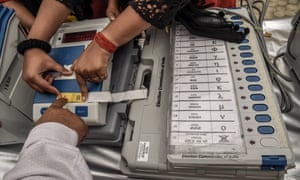
Kamal Gupta, a businessman from Almora, an Uttarakhand state district that votes on Thursday, said the election campaign had been muted compared with the last one, in 2014. “This time there is no noise, it is very dull,” he said.
“I will vote for Modi,” he said. “He has shown his boldness and seriousness in handling India’s crisis during the Pulwama attack.”
In West Bengal, posters for the regional ruling party, the Trinamool Congress (TMC), duelled for space with those of the BJP. “We are fed up with the TMC,” Raju Sarkar, a driver from Alipurduar district who voted on Thursday told the Guardian.
“It does nothing for the people: no plans or schemes. But look at BJP, it has so many schemes like Save and Educate Girl Child,” he said, referring to a Modi government policy aimed at curbing the mortality rates of girls.
The Guardian

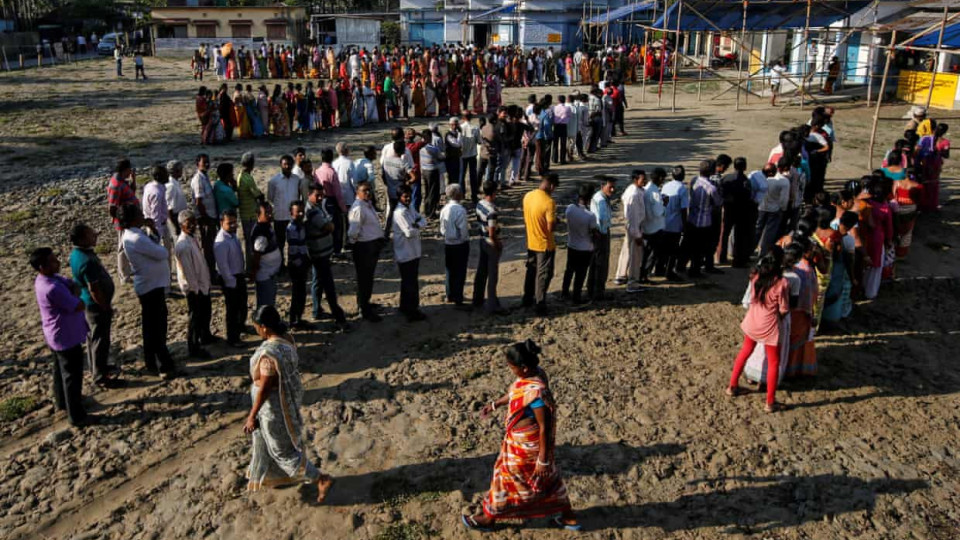


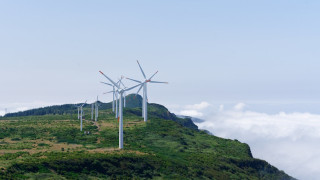
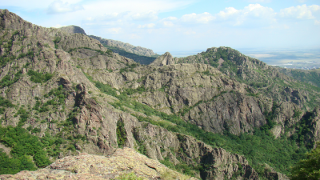
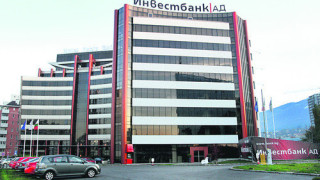
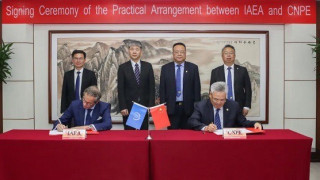

Leave a comment